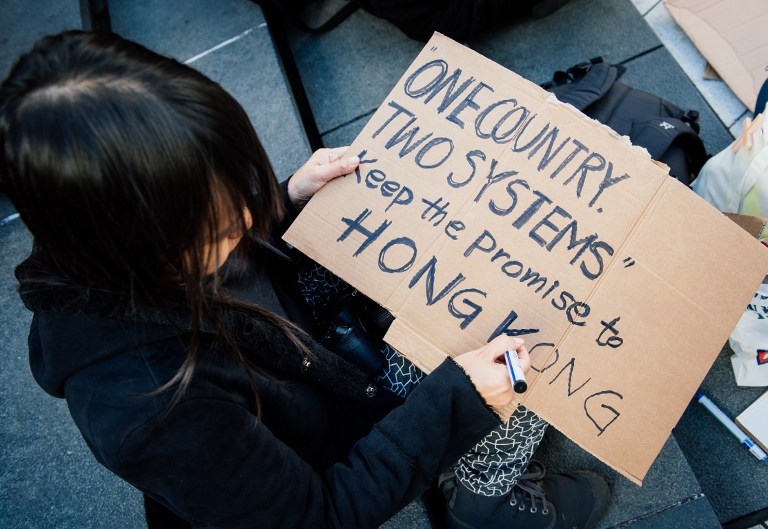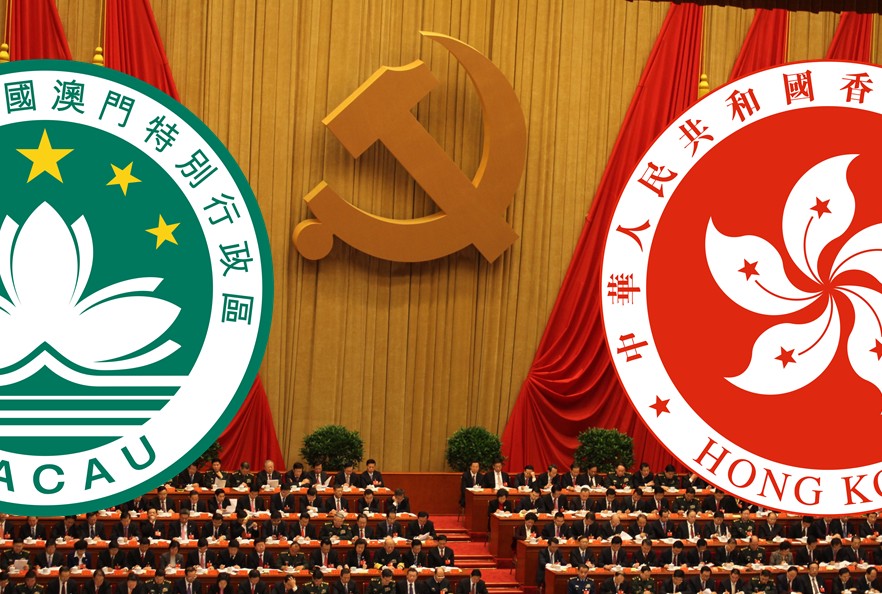The political spotlight fell briefly this month on two cities half a world apart, to reflect contrasting images of Beijing’s Hong Kong dilemma.
Washington D.C. and the former Portuguese colony of Macau make for unlikely partners in this exercise. But together they illustrate the two competing dimensions of the Hong Kong problem.
Hong Kong’s last British governor, Christopher Patten, recently told a Washington, D.C. audience that Hong Kong had not been given what it thought it had been promised by Beijing when Hong Kong was transferred from British to Chinese rule in 1997.

He was speaking by video link from London at an event hosted by the United States government’s Congressional-Executive Commission on China (CECC). The May 3 forum addressed the question, “Will the Hong Kong Model Survive?”, and was billed as an assessment of those promises after two decades of life under Chinese rule.
Three other guest speakers were veteran democracy campaigner Martin Lee Chu-ming and his most famous young successor Joshua Wong Chi-fung, plus Lam Wing-kee, one of the Hong Kong booksellers caught up in the cross-border legal case last year.
The view from Washington
The original “one-country, two-systems” model included many promises. British negotiators had insisted that these all be written down in black and white for future reference and legal assurance, and this the Chinese did.
The promises were written into a new Basic Law constitution promulgated by Beijing in 1990. It says that Hong Kong’s way of life shall remain unchanged for 50 years from 1997 and universal suffrage elections would be introduced. It also promised a high degree of autonomy, judicial independence, that local people would be running Hong Kong, and much else.
Patten’s comments were the most provocative. He pointed to the apparent abduction from Hong Kong of one of the booksellers and most recently of a Chinese businessman.

He called on China’s current president, Xi Jinping, to reassure Hong Kong that his government remains committed to the promises made by China’s then paramount leader Deng Xiaoping in the 1980s.
The Washington scene was bound to provoke howls of protest from Beijing. Sure enough, for days afterwards, Hong Kong’s pro-Beijing media railed at the most recent affront. In Beijing, the Foreign Ministry dismissed the CECC hearing as another instance of misguided foreign meddling in China’s affairs.
Soon afterwards, however, the spotlight shifted and fell on Hong Kong’s neighbour, Macau. The former Portuguese colony was returned to Chinese rule in 1999, two years after Hong Kong made the same transition.

The occasion in Macau was an inspection tour by the third most powerful man in Beijing’s ruling Communist Party hierarchy. Zhang Dejiang is responsible for overseeing both of the new ex-colonial Special Administrative Regions: Hong Kong and Macau.
Macau as a role model
Zhang’s commentary throughout his May 8-10 visit showcased all that’s right about Macau’s new life under Chinese rule. The two SARs have the same one-country, two-systems model and the promises made to both were similar.
The contrast between them could not have been more striking. For Hong Kong, the mood was sombre and foreboding. Macau was all sunshine and smiles, what Beijing evidently expected its SARs to be and still does.
For those unfamiliar with the setting, Macau is 40 miles west of Hong Kong, across the Pearl River Estuary. The population at 650,000 is much smaller than Hong Kong’s 7.3 million. Macau’s economy depends on tourism and gaming, with casinos the main attraction.

Zhang Dejiang’s visit was preceded by press teasers advising Hong Kong to stand by for a “major announcement”. But he came and went without making any such headlines. Instead, the message was conveyed each day, with Zhang’s itinerary seemingly chosen to illustrate Hong Kong’s failings by comparative example.
On arrival at the airport, Zhang was greeted by Macau Chief Executive Fernando Chui Sai-on and extended best wishes from Beijing. Zhang said he had come to encourage, to inspect, and to experience first-hand Macau’s work in implementing central government demands.
Later in the day he said one-country, two-systems is a success in Macau. It works willingly as a Special Administrative Region and effectively implements the central government’s “comprehensive jurisdiction”.
The phrase was one that caused much consternation among Hong Kongers when they read the central government’s June 2014 White Paper. This document preceded Beijing’s August 31, 2014 decision on electoral reform, thereby setting the stage for the Occupy movement that broke out soon after.

The next day, May 9, Zhang had a busy schedule. In the morning, he spoke to a gathering of community leaders. His speech was full of praise for Macau’s accomplishments.
His next stop was Macau’s Legislative Assembly where he, in effect, rounded on all the things Beijing doesn’t like about Hong Kong by praising Macau’s positive example on each point. He praised legislators for safeguarding national security by passing the legislation that Hong Kong has avoided since the 2003 protests.

Zhang expressed three hopes. First, legislators should take their oaths of office seriously, respect the nation, the law, the executive-led system, and so on. Second, legislators should focus on economic development. Third, they should maintain the proper patriotic spirit and respect legislative procedures by rejecting disruptive behaviour.
No need to explain what put all those ideas in his head. Certainly not the behaviour of Macau’s legislators.
From the Legislative Assembly Zhang moved on to Macau’s Court of Final Appeal where he made several more pertinent points, not all of which were directed at Hong Kong. He said that although Macau lived under the one-country, two-systems model, judges must respect both the national constitution and Macau’s Basic Law.
He also visited the women’s association, where he praised their patriotic cultural activities.
At the University of Macau, Zhang spoke to an audience of about 100 invited educators and student leaders and went out of his way to praise national patriotic education.

Hong Kong’s proposed new national education curriculum was shelved after protests by students, parents, and teachers in 2012.
He also said Macau is a universally recognized success in implementing one-country, two-systems. It has proven the model works and it has a great future.
Zhang Dejiang’s visit provided the perfect occasion to moralize on every point where Macau excelled and Hong Kong is failing to meet Beijing’s expectations. Zhang also left no doubt as to who’s boss. Not Washington, London, or Hong Kong, but only Beijing.
The key to the difference lies in Patten’s assertion that Hong Kongers didn’t get what they expected. But both Hong Kong and Macau were promised the same thing. Beijing is also treating them the same, or trying to.
The other half of the equation is that Beijing didn’t get what it bargained for either. Beijing thought Hong Kong was like Macau: an apolitical colonial backwater. To date, Beijing’s only solution for this miscalculation is to try and force Hong Kong into the Macau mould… while blaming Patten and Washington for the mismatch.
Beijing seems to be hoping its solutions will eventually prevail and Hong Kong’s resistance will fade. At least that’s the scenario Beijing’s surrogates are projecting.
Meanwhile, for the next year or so, the field should be cleared to test Beijing’s assumptions. London will be bogged down by Brexit; Washington will be distracted by President Trump. That should give Beijing some breathing space to see if Hong Kong dissent is really just the work of outside agitators.
If it isn’t, Beijing might actually feel obliged to start re-calibrating its solutions.
